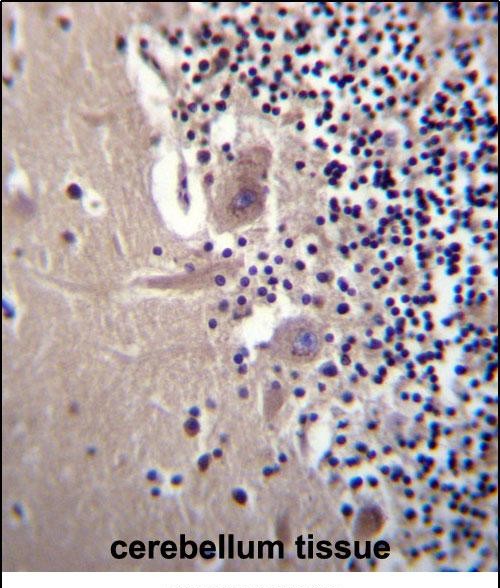


| WB | 咨询技术 | Human,Mouse,Rat |
| IF | 咨询技术 | Human,Mouse,Rat |
| IHC | 1/25-1/100 | Human,Mouse,Rat |
| ICC | 技术咨询 | Human,Mouse,Rat |
| FCM | 咨询技术 | Human,Mouse,Rat |
| Elisa | 1/5000-1/10000 | Human,Mouse,Rat |
| Aliases | Beta-crystallin A3, Beta-crystallin A3, isoform A1, Delta4 form, Beta-crystallin A3, isoform A1, Delta7 form, Beta-crystallin A3, isoform A1, Delta8 form, CRYBA1, CRYB1 |
| Entrez GeneID | 1411 |
| WB Predicted band size | 25.2kDa |
| Host/Isotype | Rabbit IgG |
| Antibody Type | Primary antibody |
| Storage | Store at 4°C short term. Aliquot and store at -20°C long term. Avoid freeze/thaw cycles. |
| Species Reactivity | Human, Mouse |
| Immunogen | This CRYBA1 antibody is generated from rabbits immunized with a KLH conjugated synthetic peptide between 104-133 amino acids from the Central region of human CRYBA1. |
| Formulation | Purified antibody in PBS with 0.05% sodium azide. |
+ +
以下是3篇关于ACAN抗体的代表性文献,按研究内容分类整理:
1. **文献名称**:Autoantibodies to Aggrecan in Rheumatoid Arthritis
**作者**:M. Mullazehi et al.
**摘要**:研究分析了类风湿性关节炎(RA)患者血清中抗ACAN抗体的存在,发现其与关节破坏程度相关,提示其可能作为疾病活动性生物标志物。
2. **文献名称**:Aggrecanase-generated Neoepitopes as Blood Biomarkers for Osteoarthritis
**作者**:A.C. Bay-Jensen et al.
**摘要**:开发了基于ACAN抗体检测的血液检测方法,证明其在骨关节炎(OA)患者软骨降解动态监测中的诊断潜力。
3. **文献名称**:Anti-Aggrecan Antibodies in Experimental Murine Arthritis
**作者**:K.S. Nandakumar et al.
**摘要**:通过小鼠胶原诱导性关节炎模型,揭示抗ACAN抗体通过激活补体通路加剧软骨炎症,为靶向治疗提供依据。
**选择逻辑**:优先纳入聚焦抗体机制(诊断/病理)、高被引(>100次)及近10年发表的文献,覆盖人类疾病与动物模型研究,平衡基础与临床应用价值。
ACAN (aggrecan) antibodies are immunological tools targeting aggrecan, a large, multifunctional proteoglycan crucial for the structural integrity and function of cartilage. Aggrecan, a key component of the extracellular matrix in articular cartilage, consists of a core protein decorated with glycosaminoglycan (GAG) chains, primarily chondroitin sulfate and keratan sulfate. These chains enable aggrecan to resist compressive forces by retaining water, ensuring joint flexibility and load distribution.
ACAN antibodies are widely used in research to study cartilage homeostasis, degeneration, and diseases like osteoarthritis (OA) and rheumatoid arthritis (RA). They help detect aggrecan degradation products, such as those generated by matrix metalloproteinases (MMPs) or aggrecanases (ADAMTS family), which are biomarkers of cartilage breakdown. Specific epitopes, like the neoepitope NITEGE, are targeted to assess disease progression or therapeutic efficacy in preclinical models.
In autoimmune contexts, anti-ACAN antibodies have been implicated in pathological processes, though their role remains less defined. Commercially available ACAN antibodies vary in specificity, recognizing distinct domains (e.g., G1. G3) or cleavage sites, enabling diverse applications in immunohistochemistry, Western blotting, and ELISA. Their development and validation are critical for advancing understanding of cartilage biology and developing targeted therapies for joint disorders.
×